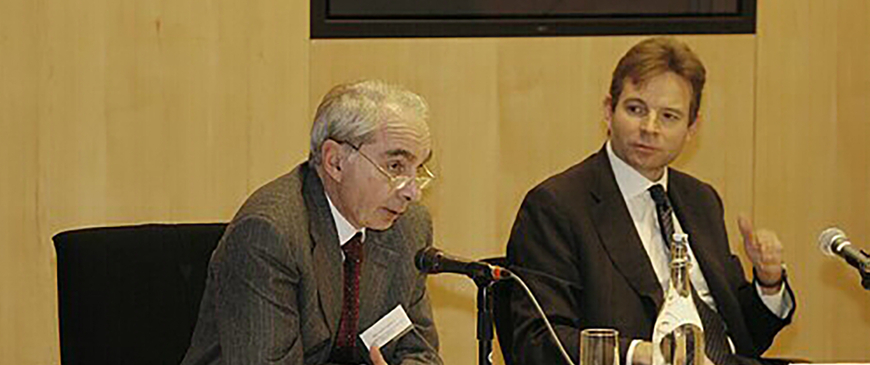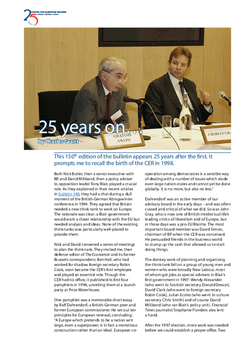
25 years on ...
This 150th edition of the bulletin appears 25 years after the first. It prompts me to recall the birth of the CER in 1998.
Both Nick Butler, then a senior executive with BP, and David Miliband, then a policy adviser to opposition leader Tony Blair, played a crucial role. As they explained in their recent articles in bulletin 148, they had a chat during a dull moment of the British-German Königswinter conference in 1994. They agreed that Britain needed a new think-tank to work on Europe. The rationale was clear: a Blair government would want a closer relationship with the EU but needed analysis and ideas. None of the existing think-tanks was particularly well-placed to provide them.
Nick and David convened a series of meetings to plan the think-tank. They invited me, then defence editor of The Economist and its former Brussels correspondent. Ben Hall, who had worked for shadow foreign secretary Robin Cook, soon became the CER’s first employee and played an essential role. Though the CER had no office, it published its first four pamphlets in 1996, unveiling them at a launch party at Price Waterhouse.
One pamphlet was a memorable short essay by Ralf Dahrendorf, a British-German peer and former European commissioner. He set out ten principles for European renewal, concluding: “A Europe which pretends to be a nation writ large, even a superpower, is in fact a monstrous construction rather than an ideal. European co-operation among democracies is a sensible way of dealing with a number of issues which elude even large nation-states and cannot yet be done globally. It is no more, but also no less.”
Dahrendorf was an active member of our advisory board in the early days – and was often cussed and critical of what we did. So was John Gray, who is now one of British intellectual life’s leading critics of liberalism and of Europe, but in those days was a pro-EU Blairite. The most important board member was David Simon, chairman of BP when the CER was conceived. He persuaded friends in the business world to stump up the cash that allowed us to start doing things.
The donkey work of planning and organising the think-tank fell on a group of young men and women who were broadly New Labour, most of whom got jobs as special advisers in Blair’s first government in 1997: Wendy Alexander (who went to Scottish secretary Donald Dewar), David Clark (who went to foreign secretary Robin Cook), Julian Eccles (who went to culture secretary Chris Smith) and of course David Miliband (who ran Blair’s policy unit). Financial Times journalist Stephanie Flanders also lent a hand.
After the 1997 election, more work was needed before we could establish a proper office. Two people were especially helpful: Maurice Fraser, who had advised Conservative foreign secretary Douglas Hurd and later ran the European Institute at the London School of Economics (he died in 2016), and Liam Byrne, who became a Labour minister and remains an MP.
In January 1998 I left The Economist to join Ben Hall in our new office in Tufton Street. Soon afterwards, we launched the bulletin, as a vehicle for shorter pieces. In 2006, writing in a special 50th edition of the bulletin, I highlighted some of the outstanding contributions we had had from guest authors. Jacques Delors, for example, had written a piece criticising the drafting of a European constitution, since, he said, constitutions belonged to nation-states. “My vision of an enlarged Europe is that, at the start, it should consist of both a geopolitical entity bringing together a wider Europe – ‘the Union’ – and an avant-garde that is overtly organised into a federation of nation-states.” Rather Macronian.
In our early years we were in many respects a New Labour think tank, but we soon worked out we would have more influence as a cross-party institution. We have happily engaged with serious politicians of all persuasions, including all the Conservative governments since 2010. This was not always easy during Boris Johnson’s government, but we still found Conservative ministers willing to speak on our platforms.
Ever since its foundation the CER has had two missions – to come up with ideas and policies for making the EU more effective; and to improve the quality of the EU-UK relationship. Much as we regret the decision of the British to leave the EU in 2016, we are confident that our twin missions remain as pertinent as ever. Brexit did make the first mission slightly more difficult in some quarters, which is why we opened offices in Brussels and Berlin. We have not found it difficult to demonstrate that we are a European think-tank: the proportion of our researchers that are non-British has seldom dipped below 50 per cent.
Not only our missions have remained constant, but also our style. We are a serious, sober, think-tank that believes in evidence-based policy-making. The CER is certainly media-friendly, which is why we are often quoted, but we are not a flashy organisation. Our prescriptions – and we make lots of them – are within the bounds of practical politics. We want to be useful to policy-makers and are less academic than some think-tanks. Our small size – the staff has never exceeded 13 or 14 – has fostered a culture of teamwork (we avoid silos: foreign policy experts edit pieces by economists, and vice versa).
We have maintained output of extremely high quality for 25 years because our researchers – supported by a superb admin team – have been brilliant. Here are the names of our previous full-time researchers, and where they ended up. Alex Ashbourne is a defence consultant; Katinka Barysch is director of political relations at Allianz; Sophia Besch is at the Carnegie Endowment in Washington DC; Hugo Brady worked for European Council President Donald Tusk and is now at the International Centre for Migration Policy Development in Vienna; Edward Bannerman worked in several EU cabinets and is now with the European Bank for Reconstruction and Development; Edward Burke is a lecturer at University College Dublin; Steven Everts worked in several EU cabinets and is now in the External Action Service; Agata Gostyńska-Jakubowska is head of government affairs for Central and Eastern Europe at Apple; Heather Grabbe worked in an EU cabinet and then ran the Open Society European Policy Institute; Ben Hall is Europe editor of the Financial Times; Daniel Keohane is at the Brexit Institute, Dublin City University; Rem Korteweg is at the Clingendael Institute; Bobo Lo is an independent analyst; Christian Odendahl is European economics editor of The Economist; Beth Oppenheim is at the Tony Blair Institute in Israel; Mark Leonard runs the European Council on Foreign Relations; Sam Lowe is a partner at Flint Global; Alasdair Murray is head of corporate affairs at KPMG; Simon Tilford is a director of the Oracle Partnership; Adam Townsend is a corporate lawyer; Kitty Ussher was an MP and minister and is now chief economist at the Institute of Directors; Tomáš Valášek became Slovakia’s ambassador to NATO and is now a Slovak MP; and Aurore Wanlin is director of corporate communications at Edelman.
Let us also remember three gifted colleagues who died very young: Clara Marina O’Donnell, Stephen Tindale and Philip Whyte.
If the EU evolves in such a way that it no longer needs reform, and the UK-EU relationship reaches a stable and happy equilibrium, I shall be the first to suggest winding up the CER. But I suspect the CER will still be in business in 25 years time.
Charles Grant is director of the Centre for European Reform.

